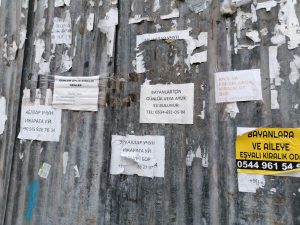Sherzod Eraliev, Academy of Finland Post-doctoral Researcher at the Aleksanteri Institute, shares his fieldwork experience in Istanbul, Turkey
Although the Covid-19 pandemic is still ongoing and some countries are already facing the fifth wave of the pandemic, restrictions in international travels have become less strict allowing the possibility of fieldworks for researchers. However, Turkey has since last year been one of the few countries to allow foreigners, albeit with certain restrictions, to visit the country in an attempt to compensate the losses to its tourism sector. And my first visit to Turkey for fieldwork was in early August of 2020, when there were still a lot of mobility restrictions induced by the pandemic. Back then, I was accompanying Rustamjon Urinboyev, who had already started his fieldwork in early 2019. We decided to conduct a fieldwork in the middle of the pandemic to find out the immediate effects of the pandemic on migrants, the most vulnerable population group during such crises.
This last fieldwork was the first one since I started my individual research project funded by the Academy of Finland. Started in September 2021, this project investigates the mutually transforming interactions between multiple actors and institutions on different levels and chains of migration governance in a comparative perspective in Russia and Turkey. I use Central Asian migrant workers in these countries as my case since they are the largest migrant groups in Russia and one of the largest and growing migrant groups in Turkey. Both Russia and Turkey share many similarities: they both have become large migration hubs in recent decades, share borders with the European Union, have become more and more autocratic in recent years, a large share of migrants is employed in informal sector, etc.

In Istanbul, my main fieldwork site is Kumkapi neighbourhood in the city’s central Fatih district. Historically one of the most ethnically diverse neighbourhoods in Istanbul, in the last decade Kumpaki has become a hub for migrant workers from different parts of the world. However, in the past decade it has mostly become an “Uzbek mahalla” due to a large number of cafés and restaurants serving Uzbek food, numerous cargo companies that ship clothes to Uzbekistan, many clothing stores and stalls selling Uzbek fashions suitable in the area. Walking through the streets of Kumkapi, you can spot hundreds of Uzbek migrants. This is probably one of the most important differences with Moscow, the largest destination for Uzbek migrants in Russia. Unlike in Istanbul, there are no ethnic enclaves in Moscow, meaning migrant communities are dispersed with migrants living in different parts of the city, with the small exception of some industrial zones and fruits/vegetable markets with higher concentration of Central Asian migrants.

Uzbeks who live in other districts of Istanbul come to Kumkapi during the weekends in order to meet and socialize with their friends in Uzbek cafés. Therefore, many newly arrived migrants stay in shared apartments in Kumkapi and undergo their initial introduction and adaptation to the Turkish labor market. The emergence of an Uzbek mahalla in Kumkapi can be explained by its vicinity to the shopping areas of Laleli (frequented by a large number of shuttle traders from Uzbekistan), with its informal employment possibilities and the availability of cheap housing and accommodation in the quarter. Unlike Moscow, where migrants have to minimize their presence in public space to avoid frequent police checks, Uzbek migrants in Istanbul usually are not afraid to walk freely in streets notwithstanding the fact that the majority of them do not possess documents that give right to reside and/or work.

In the conference that the Aleksanteri Institute organized in late October on migration issues, Anna-Liisa Heusala and Kaarina Aitamurto presented a paper “Authoritarian Context and Outsider Position in Fieldwork on Migration in Russia”, where the authors discussed, among others, the difficulties Western researchers may face in an authoritarian context, where not only authorities, but also research objects – migrants could perceive the work done by the researchers – that is, the data collection in the field as something that can cause trouble. Well, while it was relatively easier for me to establish contacts as a person sharing the same linguistic, identity, and cultural background and citizenship with migrants, it is never easy to gain trust of research informants. Uzbek migrants coming from an authoritarian context, who have heard or witnessed about their government’s persecution in foreign countries (especially during the previous president’s time), do not always trust other Uzbeks they don’t know in person. During my fieldwork trips to both Russia and Turkey I had to invest time and resources to gradually gain trust of migrants. Only after trusting you totally, are they eager to share their stories, grievances, and dreams as well as show their living and (if possible) working places.
Overall, this fieldwork proved to be a productive one in terms of data collection: interviews, observations and visual documentation.
